THE MISSOURI PLAY-PARTY Journal of American folklore, Volume 24; 1911; By American Folklore Society
BY MRS. L. D. AMES
Some thirty years ago, in most country places, the Missouri playparty was at the height of popularity as a serious form of amusement, — serious not in the sense of lacking in fun and jollity, but in the sense that it was held not as a revival of old customs or in defiance of better taste, but because it yielded more genuine pleasure and recreation than any other form of amusement known to those who took part in it. In the neighborhood where I was born and reared, the play-party was the common form of amusement at the gatherings of young people of the best class. As a little girl, I was permitted to sit up and look on when the parties were held at my father's or my grandfather's home.
These play parties were really dances. The players did not dance, however to the music of instruments, but kept time with various steps to their own singing. But they were not called dances: they were called simply parties. The better class of people in the country did not believe in dancing. Regular dances, where the music was furnished by a " fiddler," were held, for the most part, only in the homes of the rough element. They were generally accompanied by cardplaying, and frequently by drunkenness and fighting. The better class ranked dancing, in the moral scale, along with gambling and fishing on Sunday. It was not good form, and was tabooed on grounds of respectability.
At that time, also, the country church was alive and flourishing. Many, perhaps most, of the people who attended the parties, were church members. The church rules forbade dancing, and there was no thought of evading the letter of the law. Therefore, if the boy or girl danced a single quadrille to the music of a violin, he had " broke over," as the common expression was, and knew that at the next protracted meeting he was a fit subject for reconversion, and that the preacher's pointed words were aimed straight at him; while, on the other hand, he might dance to the time of his own singing from seven in the evening to three o'clock the next morning, and suffer therefrom no qualms of conscience. It was not dancing: it was only playing.
The invitations to these parties were by word of mouth, and delivered by one or more young men on horseback, who were said to "get up " the party. All of the eligible young people within a radius of from three to five miles were invited. The preparations made by the hostess consisted in removing the carpets and furniture from the rooms to be used by the players. Chairs and benches were placed around the sides of the rooms. It was not customary to serve refreshments. When they were served, they consisted of pies and cakes, and perhaps apples or cider. The young people came to the party on horseback, in carts, buggies, spring-wagons, and "big" (farm) wagons, or, if there happened to be snow on the ground, in sleighs and on sleds.
The playing would begin as soon as four or five couples had arrived, and would continue, with only short intermissions for breathing-spells, until the party broke up. This might be anywhere from midnight to three o'clock in the morning. Sometimes the playing went on in two or three rooms at one time. Thcplaying consisted in keeping step to the singing, and at the same time going through various movements: as swinging partners by one hand or both; advancing, retreating, and bowing; dancing in circles of four or eight; promenading singly or in pairs, sometimes hand in hand, sometimes with crossed hands; weaving back and forth between two rows of people going in opposite directions, and clasping right and left hands alternately with those they meet; etc. Sometimes the words of the song sung by the players indicated the various movements. At other times the players were supposed to know the manner of playing. They never " called off " the changes, as was done in the regular dances; and the method of playing depended somewhat upon the whim of individual leaders. The words of the songs they sang were a very crude lot of rhymes,— crude in sense and in form. The tunes were frequently familiar airs borrowed to suit their needs. The playing was generally started by a song that went like this:
BOUNCE AROUND
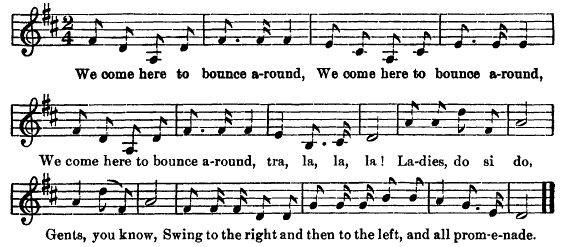
We come here to bounce around,
We come here to bounce around,
We come here to bounce around,
Tra, la, la, la!
Ladies, do si do.
Gents, you know,
Swing to the right
And then to the left,
And all promenade.
Just us four to bounce around,
Just us four to bounce around,
Just us four to bounce around,
Tra, la, la, la!
Ladies, do si do.
Gents, you know,
Swing to the right
And then to the left,
And all promenade.
These words and the movements accompanying them were repeated till the players felt the need of a change. The parties took their name later from this song. In a few years this kind of party was dying out in most places. In our neighborhood it gave way to a much milder sort of party, known as a " social." To distinguish the play-party from the "social," it was called a " bounce-around."
Other dance-songs used are given below.
WE'LL ALL GO DOWN TO ROWSER
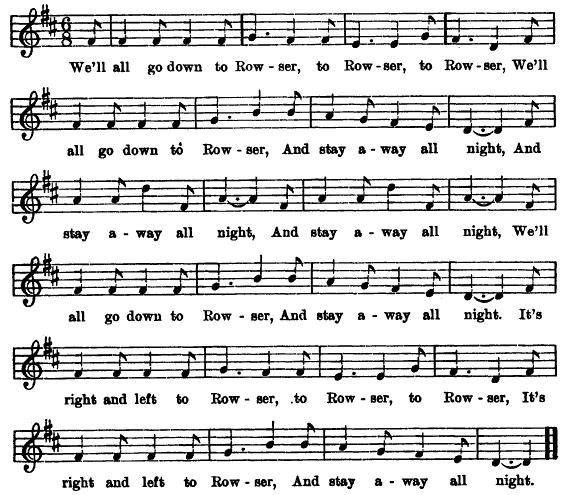
1. We'll all go down to Rowser, to Rowser, to Rowser,
We'll all go down to Rowser,
And stay away all night,
And stay away all night,
And stay away all night,
We'll all go down to Rowser,
And stay away all night.
2. My father he will scold me, scold me, scold me,
My father he will scold me
For staying away all night, etc.
3. My mother she'll uphold me, uphold me, uphold me,
My mother she'll uphold me
And say I did just right, etc.
4. We'll all go down to Rowser's, to Rowser's, to Rowser's,
We'll all go down to Rowser's
And get some good old beer, etc.
5. It's right and left to Rowser's, to Rowser's, to Rowser's,
It's right and left to Rowser's,
To get some good old beer, etc.
To the same tune they sang, —
1. My father and mother were Irish,
My father and mother were Irish,
My father and mother were Irish,
And I was Irish too,
And I was Irish too,
And I was Irish too;
My father and mother were Irish,
And I was Irish too.
2. We kept the cow in the kitchen, etc.,
And that was Irish too.
3. We kept the pig in the parlor, etc.,
And that was Irish too.
JIM ALONG JOE

1. Cat's in the cream-jar,
Run, girls, run!
Fire in the mountains,
Fun, boys, fun!
CHORUS: Hey, Jim along, Jim along, Josie!
Hey, Jim along, Jim along, Jo!
2. First to the court-house,
Then to the jail,
Hang my hat on a
Rusty nail.
ANGELINA
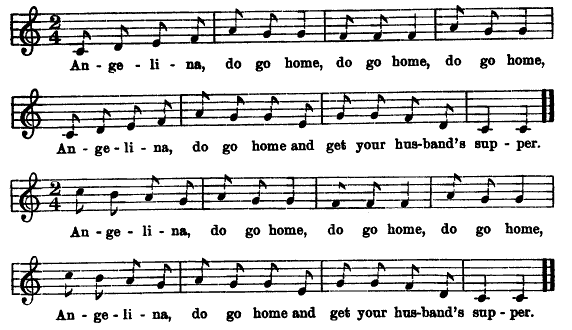
1. Angelina, do go home, do go home, do go home,
Angelina, do go home, and get your husband's supper. [Repeat.]
2. Nothing there but bread and butter, bread and butter, bread and butter,
Nothing there but bread and butter and a cold cup of tea. [Repeat.]
3. Fiddler's drunk and he can't play, he can't play, he can't play,
Fiddler's drunk and he can't play so early in the morning. [Repeat.]
The different stanzas sung to the same tune frequently had no connection in meaning, but were sung for the sake of variety.
OH AIN'T I GONE? (GOODBYE SUSAN JANE)
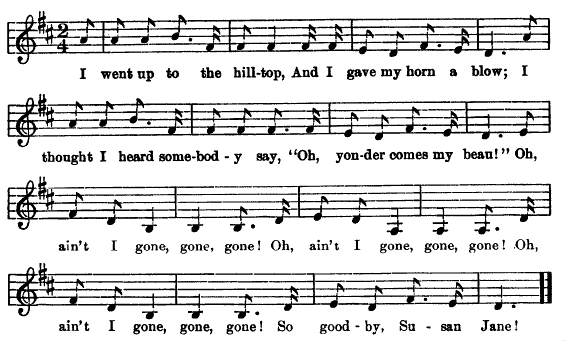
1. I went up to the hill-top,
And I gave my horn a blow;
I thought I heard somebody say,
"Oh, yonder comes my beau!"
CHORUS: Oh, ain't I gone, gone, gone,
Oh, ain't I gone, gone, gone,
Oh, ain't I gone, gone gone!
So good-by, Susan Jane!
2. I wouldn't marry an old maid,
I'll tell you the reason why:
Her neck's so long and slender,
I'm afraid she'd never die.
3. You can ride the old gray horse,
And I will ride the roan.
You can talk to your sweetheart,
But you'd better let mine alone.
4. I wish I had a needle and thread
As fine as I could sew,
I'd sew my true love to my side,
And down the river I'd go.
5. I wish I had a little red box
To put my true love in,
To take her out and kiss her,
And put her in again.
6. Higher up the cherry-tree,
Riper grows the cherry,
I never saw a pretty girl,
But what she wanted to marry.
7. Master had an old black cow,
She had a hollow horn;
Every tooth in her old head
Would hold a barrel of corn.
S. They took me to the station
And put me on the train,
And sent me down to Jefferson
To wear the ball and chain.
9. I went to see my Susan,
She met me at the door,
Her shoes and stockings in her hand.
Her feet all over the floor.
SHOOT THE BUFFALO

1. Oh, we'll shoot the Buffalo,
Yes, we'll shoot the Buffalo,
And we'll rally round the cane-brake
And shoot the Buffalo.
2. Oh, the girls will knit and spin,
And the boys will sit and grin,
And we'll rally round the cane-brake
And shoot the Buffalo.
3. Oh, the hawky shot the buzzard,
And the buzzard shot the crow,
And we'll rally round the cane-brake
And shoot the Buffalo.
4. Oh, the Buffalo will die,
For we shot him in the eye,
And we'll rally round the cane-brake
And shoot the Buffalo.
5. Oh, the Buffalo is dead,
For we shot him in the head,
And we'll rally round the cane-brake
And shoot the Buffalo.
If there were not stanzas enough to make the play sufficiently long, the same stanzas were sung again and again. When one set of players exhausted themselves, they yielded the floor to others who had been resting and talking.
CONSOLATION FLOWING FREE

1. Consolation flowing free,
Consolation flowing free,
Consolation flowing free,
Come, my love, and go with me!
2. I'm too young, I cannot go,
I'm too young, I cannot go,
I'm too young, I cannot go,
For my mother told me so.
3. You're old enough, you are just right,
You're old enough, you are just right,
You're old enough, you are just right,
I asked your mother last Saturday night.
4. Cream and peaches twice a week,
Cream and peaches twice a week,
Cream and peaches twice a week,
Kiss her on the rosy cheek.
WEEVILY WHEAT
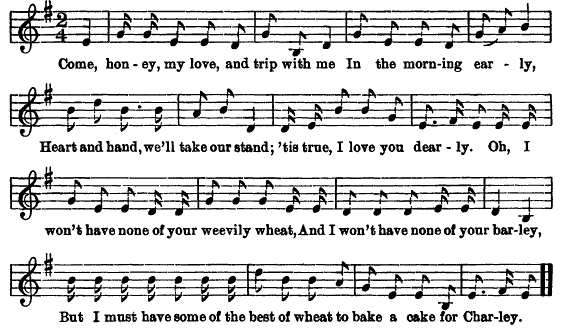
1. Come, honey, my love, come trip with me
In the morning early,
Heart and hand, we'll take our stand;
'Tis true I love you dearly.
CHORUS: Oh, I won't have none of your weevily wheat,
And I won't have none of your barley,
But I must have some of the best of wheat
To bake a cake for Charley.
2. For Charley he's a nice young man,
Charley he's a dandy;
Charley loves to kiss the girls
Because it comes so handy.
3. It's over the river to see the gay widow,
It's over the river to Charley,
It's over the river to feed my sheep
And measure up the barley. ^
4. If you love me like I love you,
We have no time to tarry,
We'll keep the old folks fixing round
For you and I to marry.
In the above song all the stanzas after the first were sung to the tune of the chorus.
SANDY HE BELONGED TO THE MILL
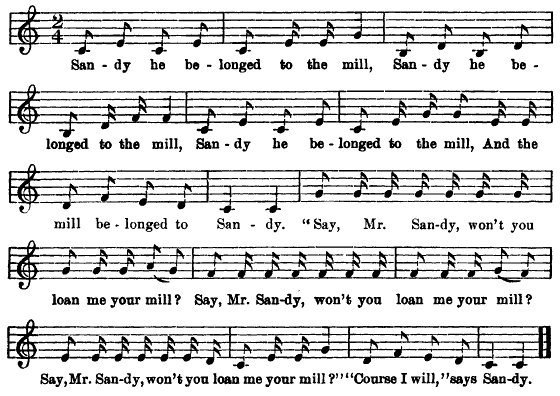
Sandy he belonged to the mill,
Sandy he belonged to the mill,
Sandy he belonged to the mill,
And the mill belonged to Sandy.
"Say, Mr. Sandy, won't you loan me your mill?
Say, Mr. Sandy, won't you loan me your mill?
Say, Mr. Sandy, won't you loan me your mill?"
"'Course I will," says Sandy.
I'VE BEEN TO THE EAST

I've been to the East I've been to the West,
I've been to the jay-bird's altar,
And the prettiest girl I ever did see
Was old John Jones's daughter.
As this was sung, the real name of the father of some girl on the floor was substituted for "John Jones," and the young man without a partner chose her for his partner. Many of the plays included a method of changing partners. In the following the players took the floor with one too many boys. At first the boy without a partner had to promenade between two rows of players while they sang:
SKIP TO MY LOU

1. Lost your partner,
What'll you do?
Lost your partner,
What'll you do?
Lost your partner,
What'll you do?
Skip-to-my-Lou, my darling.
To this the boy answered, as he took some other fellow's partner and swung her around,—
2. I'll get another one,
Better one, too,
I'll get another one,
Better one, too,
I'll get another one,
Better one, too,
Skip-to-my-Lou, my darling.
The young man who was robbed of a partner then had to secure a new one in the same way. Sometimes the attempt to secure a partner failed, the boy who was with the girl swinging her around himself. The refusal was accepted, and the disappointed young man tried again while they sang,—
3. Can't get a red bird,
A blue bird will do,
Can't get a red bird,
A blue bird will do,
Can't get a red bird,
A blue bird will do,
Skip-to-my-Lou, my darling.
Sometimes the young man whose partner had been taken turned im mediately and took her back, while they sang,—
4. Gone again,
Skip-to-my-Lou,
Gone again,
Skip-to-my-Lou,
Gone again,
Skip-to-my-Lou,
Skip-to-my-Lou, my darling.
5. Common as corn-bread,
Commoner, too,
Common as corn-bread,
Commoner, too,
Common as corn-bread,
Commoner, too,
Skip-to-my-Lou, my darling.
6. Chicken in the dough-tray,
Shoo, shoo, shoo!
Chicken in the dough-tray,
Shoo, shoo, shoo!
Chicken in the dough-tray,
Shoo, shoo, shoo!
Skip-to-my-Lou, my darling.
Another play which helped to choose partners was —
THE JUNIPER TREE
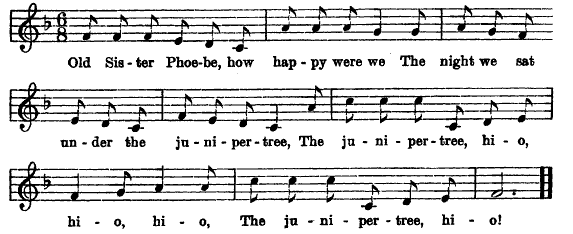
1. Old Sister Phoebe, how happy were we
The night we sat under the juniper-tree,
The juniper-tree, hi-o, hi-o, hi-o,
The juniper-tree, hi-o!
2. Here is a young lady sits down to sleep,
And wants a young gent to keep her awake,
To keep her awake, hi-o, hi-o, hi-o,
To keep her awake, hi-o!
3. Write his name down and send it by me,
And send it by me, and send it by me,
Tom Todd it shall be, hi-o, hi-o, hi-o,
Tom Todd it shall be, hi-o!
JOLLY OLD MILLER BOY
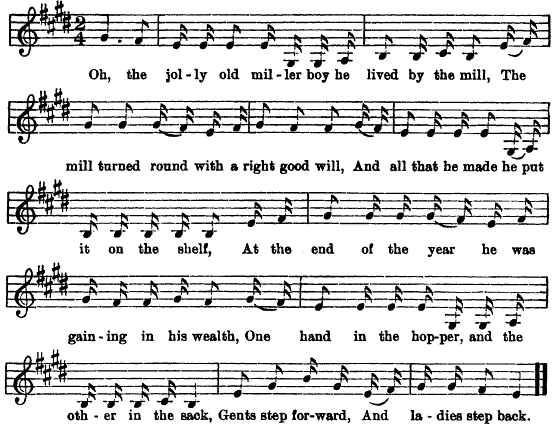
Oh, the jolly old miller boy he lived by the mill,
The mill turned round with a right good will,
And all that he made he put it on the shelf,
At the end of the year he was gaining in his wealth,
One hand in the hopper, and the other in the sack,
Gents step forward, and ladies step back.
Another was the slower tune of:
WE'RE MARCHING ROUND THE LEVEE

1) We're marching round the levee,
We're marching round the levee,
We're marching round the levee,
For we shall gain the day.
2. Go out and in the window,
Go out and in the window,
Go out and in the window,
For we shall gain the day.
As they sang this second verse, the one without a partner went out of and into the circle under the raised arms of the players. The next verse ran,—
3. Go forth and face your lover,
Go forth and face your lover,
Go forth and face your lover,
For we shall gain the day.
The lover being chosen, the player was directed by the next verse as follows:
4. I kneel because I love you,
I kneel because I love you,
I kneel because I love you,
For we shall gain the day.
The next verse ran, —
5. I measure my love to show you,
I measure my love to show you,
I measure my love to show you,
For we shall gain the day.
In measuring the love, the boy took the girl's hands in his own and extended his arms as far as possible to the sides, throwing the boy and girl close together. The next verse ran, —
6. I'll take a sweet kiss and leave you,
I'll take a sweet kiss and leave you,
I'll take a sweet kiss and leave you,
For we shall gain the day.
The directions in the last verse were not carried out. It may have been tempting to some of the players; but public sentiment was dead against kissing-games, and public sentiment was respected.
Another of the plays in which the words gave the directions for playing was —
OLD BRASS WAGON
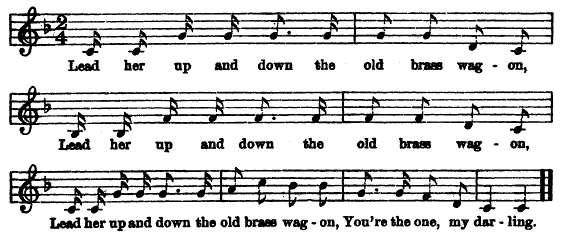
1. Lead her up and down the old brass wagon,
Lead her up and down the old brass wagon,
Lead her up and down the old brass wagon,
You're the one, my darling.
2. Swing and turn the old brass wagon,
Swing and turn the old brass wagon,
Swing and turn the old brass wagon,
You're the one, my darling.
3. Hands all around the old brass wagon,
Hands all around the old brass wagon,
Hands all around the old brass wagon,
You're the one, my darling.
4. Right and left around the old brass wagon,
Right and left around the old brass wagon,
Right and left around the old brass wagon,
You're the one, my darling.
5. Promenade around the old brass wagon,
Promenade around the old brass wagon,
Promenade around the old brass wagon,
You're the one, my darling.
CAPTAIN JINKS
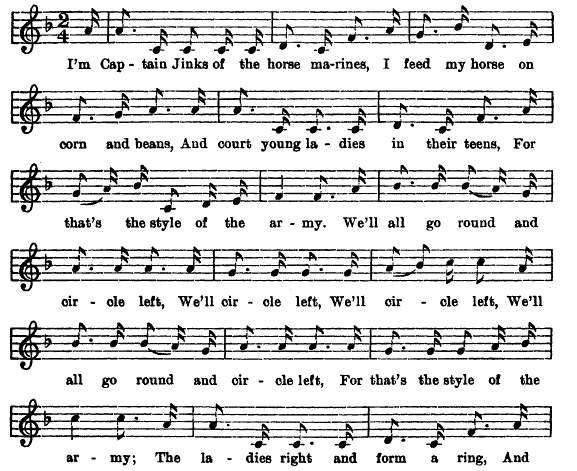

I'm Captain Jinks of the horse marines,
I feed my. horse on corn and beans,
And court young ladies in their teens,
For that's the style of the army.
We'll all go round and circle left.
We'll circle left, we'll circle left,
We'll all go round and circle left,
For that's the style of the army;
The ladies right and form a ring,
And when they form you give'm a swing,
And when you swing you give'm a call,
And take your lady and promenade all.
OLD DAN TUCKER
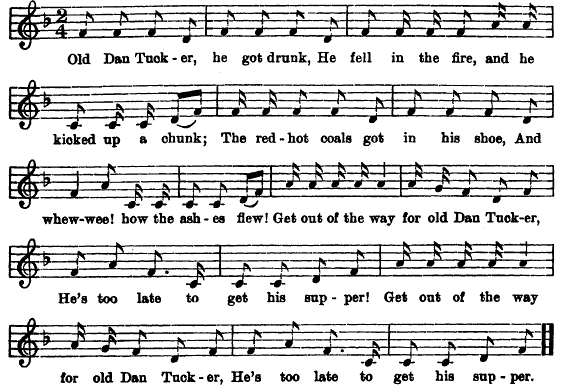
1. Old Dan Tucker, he got drunk,
He fell in the fire, and he kicked up a chnnk;
The red-hot coals got in his shoe,
And whee-we how the ashes flew
CHORUS
2. Old Dan Tucker was a fine old man,
He washed his face in the frying-pan,
He combed his head with a wagon-wheel,
And he died with the tooth-ache in his heel.
3. Daniel Tucker, he's a Quaker,
He drinks buttermilk by the acre,
Supper's over, dishes washed,
Nothing left but a little bit of squash.
4. Old Dan Tucker was a fine old man,
He used to ride the Derby ram,
He sent him a-whizzin' down the hill,
And if he hasn't got up, he's a-lyin' there still.
YONDER SHE COMES

Yonder she comes, and it's "Howdy, howdy do?
Oh, where have you been
Since the last I saw you?"
INDIAN BOYS
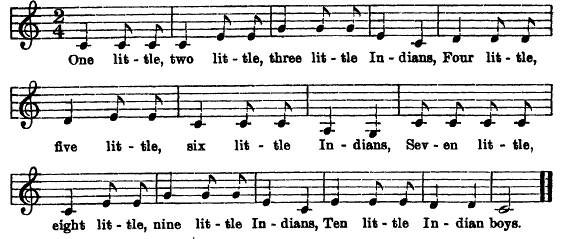
One little, two little, three little Indians,
Four little, five little, six little Indians,
Seven little, eight little, nine little Indians,
Ten little Indian boys.
[This was repeated, counting backwards.]
PASS ONE WINDOW
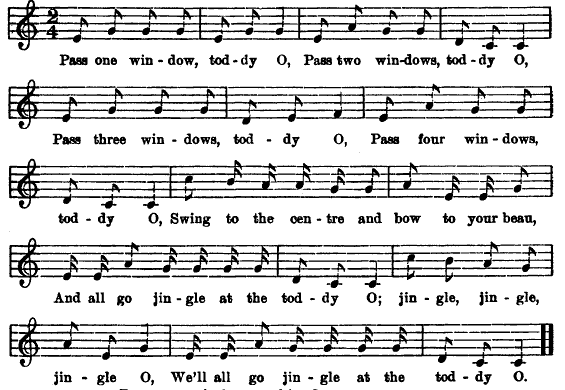
Pass one window, toddy O,
Pass two windows, toddy O,
Pass three windows, toddy O,
Pass four windows, toddy O,
Sing to the centre and bow to your beau,
And all go jingle at the toddy O.
Jingle, jingle, jingle O,
We'll all go jingle at the toddy O.
OLD GRAY HOSS
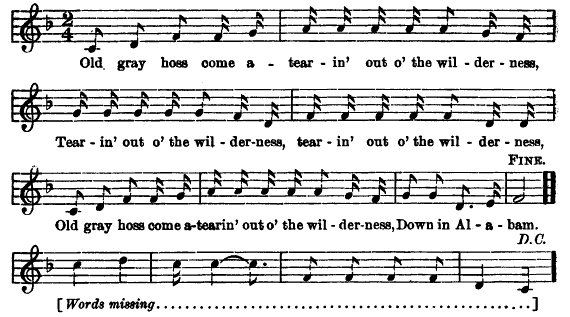
Old gray hoss come a-tearin' out o' the wilderness,
Tearin' out o' the wilderness, tearin' out o' the wilderness,
Old gray hoss come a-tearin' out o' the wilderness,
Down in Alabam.
[Words missing]
I'LL COME BACK AND BE YOUR BEAU (CORNSTALK FIDDLE)
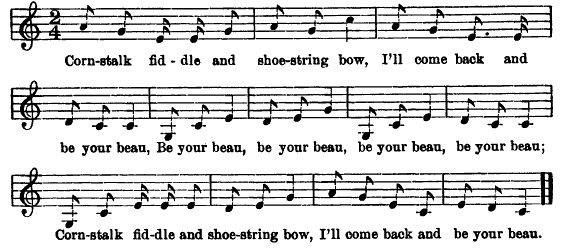
1) Corn-stalk fiddle and shoe-string bow,
I'll come back and be your beau,
Be your beau, be your beau,
Be your beau, be your beau;
Corn-stalk fiddle and shoe-string bow,
I'll come back and be your beau.
OLD MOTHER KETURAH
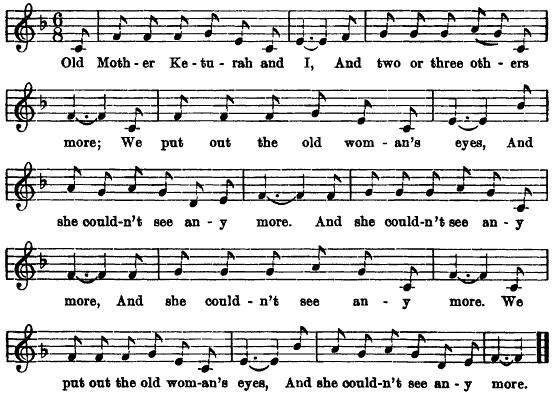
1. Old Mother Keturah and I,
And two or three others more;
We put out the old woman's eyes,
And she couldn't see any more.
And she couldn't see any more,
And she couldn't see any more.
We put out the old woman's eyes,
And she couldn't see any more.
2. Put your right foot in,
Take your right foot out,
Give your right foot a shake, shake, shake,
And turn your part about.
3. Put your left foot in, etc.
4. Put your right hand in, etc.
5. Put your left hand in, etc.
6. Put your ugly mug in, etc.
Sometimes during a resting-spell the players would choose partners by means of a game called "Clap-in, clap-out." In this game the young men retired to another room, leaving the girls alone. Some girl would then name a boy as her choice for a partner. He was then called into the room to guess who had chosen him. He indicated his guess by sitting down by the girl. If he guessed the right one, the girls kept silent, and another boy was called in to try his luck. If the first boy made a mistake, all the girls clapped their hands. He thereupon had to withdraw and try it again later on. This was kept up till all in the company had partners.
The devices for choosing partners served a useful and practical purpose. There were always bashful girls and boys who would miss their share of the fun and have no partners unless they were led out and helped along by these partner-choosing games.
Other games played in resting-spells or by those who found the dancing too strenuous were "Simon says wigwag;" "Brother, I'm bobbed;" "See, laugh, and say nothing."
Occasionally a small group of boys and girls would get into a corner as the playing went on, and play what were known as real "kissing games." Here are the words to one:
KING WILLIAM
King William was King James's son,
And the royal race he run.
He wore a star upon his breast,
Pointing to the east and west.
Go choose your east, go choose your west,
Go choose the one that you love best.
If she's not here to take your part,
Choose another with all your heart.
Down on the carpet you must kneel,
Sure as the grass grows in the field.
Salute your bride and kiss her sweet,
Now rise upon your feet.
Following are part of the words of another:
Possum pie
Made of rye,
Possum was the meat,
Rough enough and tough enough,
More than we all could eat.
This was played as a counting-out game. This thing, however, was rare. Kissing-games were frowned upon by most of the young people and all of the elders; and those girls who took part in them forfeited, to some extent, the respect of the rest.
These parties were not rough and boisterous gatherings, as might be supposed by some, on account of the character of the poetry and music which sustained them. To be sure, they were noisy and merry, rollicking and jolly, but they were participated in by young people who were proud of good blood and good behavior; and they were conducted in a spirit of decency and order. There were well-established metes and bounds of conduct, beyond which one could not go with impunity. The character of the amusement indicated merely a lack of social experience in those taking part.
These play-parties as I have described them were the chief form of social activity of my uncles and aunts, of my parents, and of my grandparents before them, all of whom grew up in Missouri, either in this county (BooneJ or in the adjoining county of Allexander Here are the words of one of the songs that comes down from my grandmother's day:
Come, all ye young people that's wending your way,
And sow your wild oats in your youthful day,
For the daylight is past, and the night's coming on,
So choose you a partner and be marching along, marching along.
Before I was old enough to attend these parties, this style of party had gone entirely out of fashion in our neighborhood. Many of our set went " away to school," and saw enough of the ways of the world to make us look contemptuously down upon the noisy and undignified parties held by that unsophisticated set of young people of a few years before. We still did not dance, but were ridiculously sober and sedate and correct at "socials," as our parties were called.
These old-fashioned play-parties, however, are not by any means entirely out of date. In many rural neighborhoods remotely situated they have never ceased to be the chief form of amusement at social gatherings of young people. In other neighborhoods they have been revived after a lapse of many years. Following are some of the party songs recently collected from some young people who still occasionally attend these parties.
EIGHTEEN HUNDRED AND SIXTY


In eighteen hundred and sixty,
I used to go to see-ee
A pretty little girl in Georgia,
How dearly she loved me!
She wanted us to marry
As soon as the war was over,
And we could live together,
Like chickens in the clover.
TWENTY-FIVE MILES TO LONDON
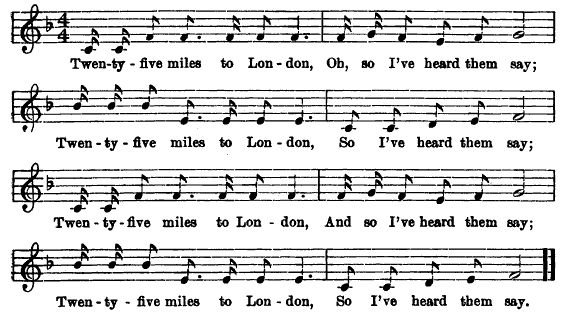
Twenty-five miles to London,
Oh, so I've heard them say;
Twenty-five miles to London,
So I've heard them say;
Twenty-five miles to London,
And so I've heard them say;
Twenty-five miles to London,
So I've heard them say.
I'M GOING TO MARRY


I'm going to marry,
Yes, I am;
I'm going to marry Sugar Betty Ann.
Ask the old lady,
Ask the old man,
If I can't marry Sugar Betty Ann.
FARE YOU WELL
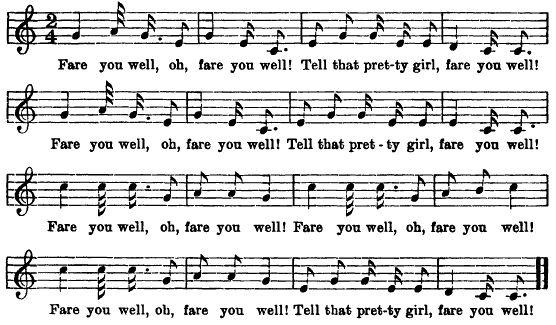
1. Fare you well, oh, fare you well!
Tell that pretty girl fare you well!
Fare you well, oh, fare you well!
Tell that pretty girl fare you well. [Repeat.]
2. On the steamboat ring the bell!
Tell that pretty girl fare you well!
Fare you well, oh, fare you well!
Tell that pretty girl fare you well! [Repeat.]
3. Chase the rabbit, chase the squirrel,
Chase a pretty girl round the world,
Fare you well, oh, fare you well!
Tell that pretty girl fare you well! [Repeat.]
4. Now the possum, now the coon,
Now the pretty girl round the moon.
Fare you well, oh, fare you well!
Tell that pretty girl fare you well! [Repeat.]
SHILOH
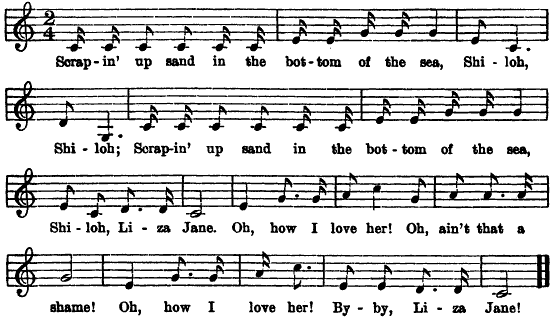
Scrapin' up sand in the bottom of the sea,
Shiloh, Shiloh;
Scrapin' up sand in the bottom of the sea,
Shiloh, Liza Jane.
Oh, how I love her! Oh, ain't that a shame!
Oh, how I love her! By-by, Liza Jane!
OLD MR. RABBIT
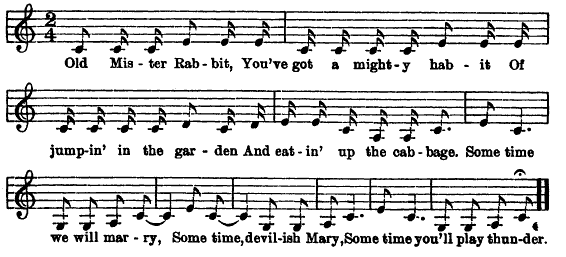
1) Old Mis-ter Rab-bit,
You've got a might-y hab- it
Of jump-in' In the gar - den
And eat-in' up the cab-bage.
CHORUS: Some-time we will marry,
Some time, devilish Mary,
Some-tiem you play thunder.
2. Old Mr. Rabbit,
Your legs are so long,
Seems to me they're
Put on wrong.
Some time, etc.
3. Old Mr. Rabbit,
Your ears are so thin,
Seems to me they're
Made out of tin.
Some time, etc.
To the tune of "Ta ra ra ra boom-de-aye."
1. Hogs in the cornfield
Rooting up the ground,
How I love my Susan Brown!
Swing to the left as we go round,
How I love my Susan Brown!
2. I went down to my grand-dad's farm,
The billy-goat chased me round the barn.
He chased me up a sycamore-tree,
And this is the song he sang to me.
[Next stanza missing.]
To the following I was unable to secure the tunes:
JACK WENT A-FISHING
Jack went a-fishing on Friday night,
On Friday night, on Friday night.
Jack went a-fishing on Friday night,
Fished all night and never got a bite.
Honor to that lady,
Oh, honor her again!
Swing that lady all around
And on to the next.
BIG BOY, LITTLE BOY
Big boy, little boy, can't you dance?
Big boy, little boy, can't you dance?
Big boy, little boy, can't you dance?
Get your horse and buggy.
OLD RACCOON
As I went out by the light of the moon,
Merrily singing the same old tune,
There I saw an old raccoon
Riding on a rail.